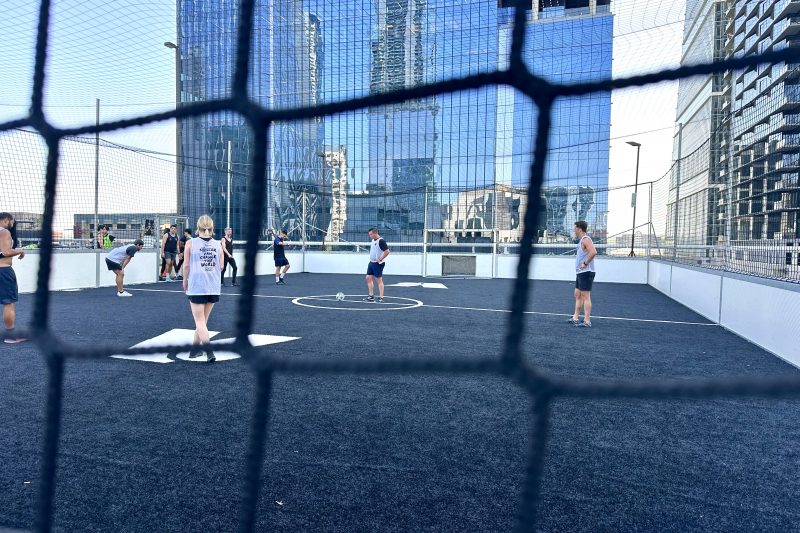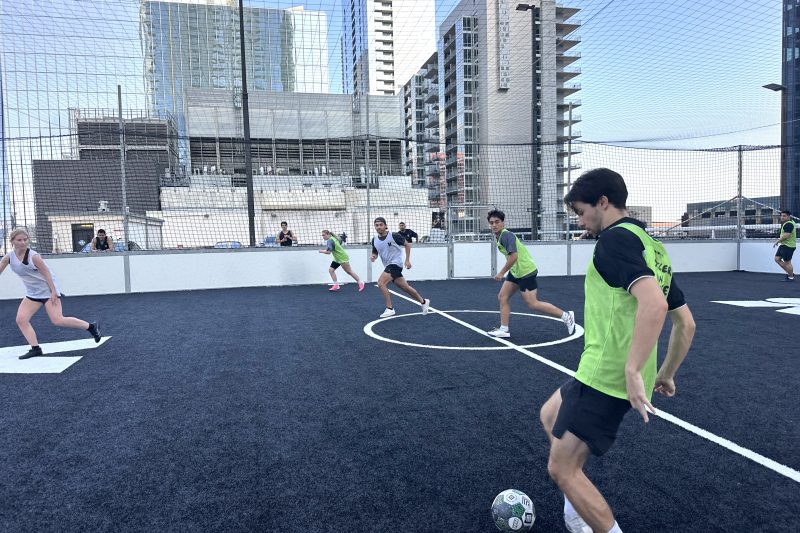Rooftop Soccer Aims to Build Community Above Downtown Austin
By Luke Lawhorn
Reporting Texas

With its rooftop soccer facility in downtown Austin, Vanta Athletics aims to build a community — and a business that can be replicated elsewhere. Luke Lawhorn/Reporting Texas
Rodrigo Ramirez looks forward to the daily pickup soccer games on the roof of a downtown Austin parking garage so much that he’ll endure the city’s rush-hour traffic to get there.
Even if he’s hobbling on crutches, as he was in early March, he makes the 40-minute commute to Vanta Athletics.
“It’s worth it, bro. Worth it every time I come over here,” Ramirez said. “By now I know a lot of these guys. It’s a great group, so I don’t even care about that drive.”
Austin’s soccer popularity can be seen through the sold-out crowds for its Major League Soccer team, Austin FC, and the strength of its high school soccer programs. Austinites also have a thriving network of pickup games running in parks. In a country where medical experts report people are losing fitness and a sense of community, Vanta Athletics is striving to keep the two together.
Vanta is Austin’s first and only rooftop soccer facility, available for memberships for anyone 18 or older. The field, which sits on top of a parking garage at 300 San Antonio St., was built in two days by its founders, Sam Clark and Tanner Friesen, last August.
Clark and Friesen ran pickup games in the backyard of Native Hostel, which closed last year, before they started developing Vanta. According to Clark, familiar faces from their previous pickup sessions, along with word of mouth, led to a good turnout at the rooftop’s grand opening. But even more than the business growth is the community growth.
“I think it gets more fun the more you come,” said Tess Jarriel, a Vanta member who comes to four or five sessions a week. “It’s really fun to play on the field, but also the conversation on the side of the field. That kind of friendship-community element has definitely grown through time.”
Clark and Friesen left their previous pickup soccer business with the idea of making soccer much larger than it was. Looking for potential rooftops or warehouses, the two found their spot after visiting Friesen’s brother, who works at the 36-floor Indeed Tower downtown.
“We would go up there, steal some lunch and their cafeteria looks out onto this garage. And at that point in time, there were two pickleball courts here,” Clark said. “ We reached out to the owner (of the pickleball courts) and we were like, ‘Who do we have to talk to to build a soccer field up here?’
“He gave us the emails of who we had to talk to,” he said. The two made phone calls and “like 20 different decks,” or presentations, about their proposal. “Then about a month and a half later, they approved us to come put it up here.”
Vanta, open 5 p.m. to 10 p.m. Monday through Saturday, runs a new session or game at the top of every hour with three teams of five rotating on and off the field. A nonmember would pay $15 per session, while a member pays $50 or $75 per month, giving them access to two to five sessions each week.
Vanta’s central location makes it easier to bring in a broad range of players. Ramirez said Vanta’s ambience makes it more of an exciting playing experience than the average soccer field.
“We’ve been needing a place like this forever,” Ramirez said. “As soon as I saw it, didn’t even think it was here. I had to come check it out.”

Vanta Athletics co-founder Sam Clark plays in a rooftop soccer game at 300 San Antonio St. Luke Lawhorn/Reporting Texas
Part of the business’ mission is to expand with downtown locations in other cities.
“When I went to play in Athens, Greece and even Brazil, you don’t know – if you’re from out of town – where the soccer spot is,” Clark said. He said that people travel to Austin by themselves and after going to Vanta, they’ll meet people on the sidelines and have conversations like, “‘Where are you guys going out tonight?’ They’re like, ‘Come with us, I will show you the best time.’ So it’s your introduction to the city is through pickup sport most of the time.”
The familiarity of playing with other Vanta members also makes for a better soccer-playing experience, Jarriel said, adding that the community of people playing on the rooftop is better because the players look out for everyone else’s safety.
“As a woman playing, it’s actually really great because right before I moved here, I would play pickup back in D.C. and I’d just get injured all the time because men playing sometimes don’t temper their momentum,” Jarriel said. “But here, I feel like there’s a safe way to play co-ed. It’s not like they’re going easy on anyone, but you’re not getting shoved face-first into a wall. A lot of the girls comment about how it’s a really competitive, safe environment for co-ed.”
Hiring coaches is a point of emphasis for Clark and Friesen. Their coaches focus on several things, Clark said: “about 40% reffing the games, 20% administrative duties, and 40% making sure everybody’s having a great time.”
One of Vanta’s four coaches, Mel Savilla, said he works to make sure players are safe, feel welcome and enjoy themselves.
“That’s one of the things I like about Sam’s idea here … make sure everybody’s heard and talk to them and you touch base with them,” Savilla said. “(It’s) kind of like a family-oriented community. Everybody knows everybody.”
Along with creating a larger community through pickup soccer is making a space for members to develop healthier habits.
“A few people who have been struggling with different addictions or different mental health issues come out here to talk to myself or my coaches and just like, use the game and my employees as a platform to feel a home to work through the problems,” Clark said. “I feel like we’re not overlooking that aspect and trying to not just grow them as soccer players and give them a great time, but actually grow them as individuals and people.”
With Vanta’s success in Austin, Clark and Friesen plan to grow their business. They are working to open a similar rooftop facility in Dallas and hope to have fields in every World Cup location by 2026.
“To know you have a place to play in every city that you go to, that you can trust, and that you know what you’re gonna get, that is our goal,” Clark said. “Just connect the whole world through soccer. In my mind, that’s exactly what you want.”